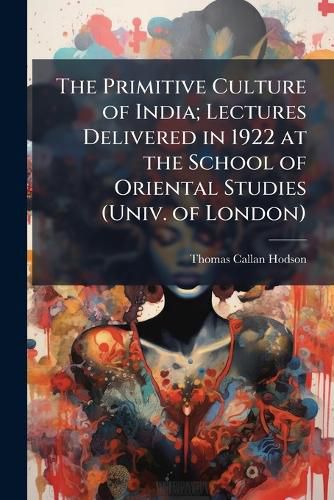Readings Newsletter
Become a Readings Member to make your shopping experience even easier.
Sign in or sign up for free!
You’re not far away from qualifying for FREE standard shipping within Australia
You’ve qualified for FREE standard shipping within Australia
The cart is loading…






"The Primitive Culture of India" presents a detailed exploration of early 20th-century anthropological perspectives on Indian society and culture. Based on lectures delivered at the School of Oriental Studies, University of London in 1922, this work by Thomas Callan Hodson delves into the social structures, customs, and beliefs of various indigenous populations within India. Hodson's study offers insights into the methodologies and theories prevalent in the field of anthropology during that era, reflecting both the scholarly interests and the potential biases of colonial-era research.
This book serves as a valuable resource for understanding the historical development of anthropological thought and its application to the Indian subcontinent. Scholars and students interested in the history of anthropology, South Asian studies, and indigenous cultures will find this a fascinating and informative read.
This work has been selected by scholars as being culturally important, and is part of the knowledge base of civilization as we know it. This work was reproduced from the original artifact, and remains as true to the original work as possible. Therefore, you will see the original copyright references, library stamps (as most of these works have been housed in our most important libraries around the world), and other notations in the work.
This work is in the public domain in the United States of America, and possibly other nations. Within the United States, you may freely copy and distribute this work, as no entity (individual or corporate) has a copyright on the body of the work.
As a reproduction of a historical artifact, this work may contain missing or blurred pages, poor pictures, errant marks, etc. Scholars believe, and we concur, that this work is important enough to be preserved, reproduced, and made generally available to the public. We appreciate your support of the preservation process, and thank you for being an important part of keeping this knowledge alive and relevant.
$9.00 standard shipping within Australia
FREE standard shipping within Australia for orders over $100.00
Express & International shipping calculated at checkout
"The Primitive Culture of India" presents a detailed exploration of early 20th-century anthropological perspectives on Indian society and culture. Based on lectures delivered at the School of Oriental Studies, University of London in 1922, this work by Thomas Callan Hodson delves into the social structures, customs, and beliefs of various indigenous populations within India. Hodson's study offers insights into the methodologies and theories prevalent in the field of anthropology during that era, reflecting both the scholarly interests and the potential biases of colonial-era research.
This book serves as a valuable resource for understanding the historical development of anthropological thought and its application to the Indian subcontinent. Scholars and students interested in the history of anthropology, South Asian studies, and indigenous cultures will find this a fascinating and informative read.
This work has been selected by scholars as being culturally important, and is part of the knowledge base of civilization as we know it. This work was reproduced from the original artifact, and remains as true to the original work as possible. Therefore, you will see the original copyright references, library stamps (as most of these works have been housed in our most important libraries around the world), and other notations in the work.
This work is in the public domain in the United States of America, and possibly other nations. Within the United States, you may freely copy and distribute this work, as no entity (individual or corporate) has a copyright on the body of the work.
As a reproduction of a historical artifact, this work may contain missing or blurred pages, poor pictures, errant marks, etc. Scholars believe, and we concur, that this work is important enough to be preserved, reproduced, and made generally available to the public. We appreciate your support of the preservation process, and thank you for being an important part of keeping this knowledge alive and relevant.